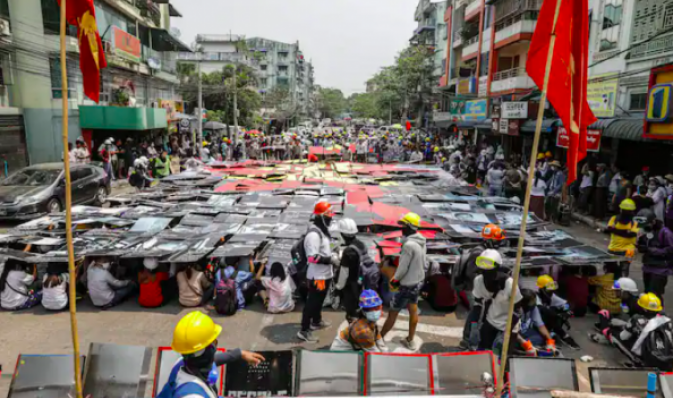
Published by The Washington Post on March 26, 2021
Maung Zarni is an exiled Myanmar scholar and activist with the Forces of Renewal Southeast Asia (FORSEA).
The images from the streets of Myanmar cities tell a brutal story. Ordinary citizens are taking to the streets to protest the military coup of Feb. 1, and the armed forces, again and again, are opening fire. By now more than 300 people — virtually all of them unarmed — have been killed around the country.
This rampant brutality has led to widespread revulsion among the populace, in ways that are likely to reverberate for years to come. There are, of course, many elements in Myanmar society — especially among members of the ethnic minorities such as the Rohingya, Shan, Karen, Kachin along the country’s periphery — who have never harbored illusions about the nature of the armed forces. The long years of military dictatorship, and the corruption and crimes against humanity, war crimes and even genocide, all with total impunity, that went with it, saw to that.
Yet the situation was somewhat different among the majority Bama, the overwhelmingly Buddhist ethnic group that also dominates the armed forces and the officer corps. For generations, many Bama have tended to view the military as the nation’s guardian of territorial integrity, the glue holding together a state they see as fragmented by deep divides of ethnicity, language and religion.
The military has worked hard to maintain the same myth, using its own propaganda apparatus to drum home the theme that only the men in uniform can hold the country together.
Yet now, thanks to the proliferating images of a war being waged against the citizenry, even the military’s former defenders are awakening to a rude reality: The once-vaunted patriotic soldiers are acting like an alien occupying force — even toward other members of their own ethnic group. The bond between the country’s dominant group and the armed forces they once identified with is vanishing.
The sense of rage is palpable. Hundreds of thousands of social media comments and public speeches, group posts, communal discussions and personal conversations attest to the deepening popular anger at the armed forces. It has become customary to refer to the troops as “terrorists” or even as “dogs of war,” an especially harsh term in Myanmar-language discourse. A nationally acclaimed poet and educator, whose writings have been read by millions of children and adolescents in school, recently posted a widely shared text on Facebook in which he described the military as a cross between a murderous mafia and a fascist-like occupier.
On March 4, United Nations human rights chief Michelle Bachelet issued a blunt statement calling for an immediate end to murder, enforced disappearances and other crimes against humanity being committed against unarmed and peaceful protesters. She specifically condemned “documented attacks against emergency medical staff and ambulances attempting to provide care to those who have been injured.”
Several defectors from the security forces have told English and Myanmar-language media outlets how their superiors ordered them to shoot to kill — including targeting family members who oppose the coup. Commanders describe neighborhoods and communities as “front lines” and refer to unarmed civilian protesters as “dangerous enemies” allegedly sitting on concealed caches of weapons in civilian homes, just waiting to attack.
This erosion of the military’s public image potentially has far-reaching consequences. Before the Feb. 1 coup, Aung San Suu Kyi — de facto leader of the civilian government and once lionized leader of the pro-democracy movement — had pursued a policy of grudging accommodation with the military. That included continuing recognition of the 2008 constitution, drawn up by the generals to enshrine a dominant political role for the military as they sought to step back from outright rule. As part of her pragmatic policy of reconciliation with the armed forces, Aung San Suu Kyi even referred to the generals as “my father’s sons,” an allusion to her father Aung San, the military leader of the country’s anti-colonial independence movement during and after World War II.
Since the Feb. 1 coup, ironically, she has been in the custody of that very same military, which has said that it will soon try her for alleged crimes during her time in office.
Since the coup, a group consisting primarily of deposed lawmakers from Aung San Suu Kyi’s own National League for Democracy has played a leading role in the protest movement. Sources close to this group told me they initially stayed within the framework laid down by their leader. They were to operate within Aung San Suu Kyi’s framework of reconciliation without justice, maintain distance from the armed organizations of the rebellious ethnic groups, to work for gradual constitutional change, and to ignore the ethnic identity of the Rohingya minority and the genocide committed against them by the military.
Yet in recent weeks, reflecting the growing popular indignation over the role of the military, the group has issued a series of statements that amount to a complete break with Aung San Suu Kyi’s policy of accommodation.
It is now clear that Myanmar society is burying for good the decades-old myth of the armed forces as the selfless defenders of national unity. If nothing changes, it looks as though Aung San Suu Kyi’s ruinous policy of accommodation with the generals is likely to meet a similar fate.









